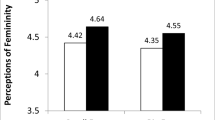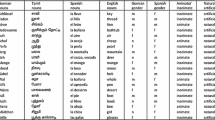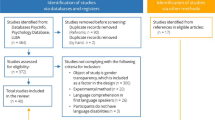Abstract
Considerable evidence suggests that, although “generic” terms (he, his, man, men) may be intended to refer to both women and men, they are often interpreted literally and thus function to exclude women. Two experiments tested the hypothesis that readers' sensitivity to and literal interpretation of gender references in prose can affect performance in a memory task. Collegestudent subjects read essays that were identical except for the use of “generic” terms versus those that specifically include women (he/she, his/her, people). In Experiment I, the Generic essay form led to better recall of the essay's factual content by male subjects, while the Specific form produced better recall by females. A similar pattern was found for female subjects in Experiment 2. In both experiments, effects were stronger for good learners. Results suggest that Generic and Specific styles are more relevant to men and women, respectively, and that the observed differences in recall may be mediated by differences in interpretation and interest based on perceived relevance.
Similar content being viewed by others
References
APA Publication Manual Task Force. (1977). Guidelines for non-sexist language in APA journals: Publication Manual Change Sheet 2.American Psychologist, 32, 487–494.
Bransford, J. D. (1979).Human cognition: Learning, understanding and remembering. Belmont, California: Wadsworth.
Henley, N. M. (1977).Body politics: Power, sex and nonverbal communication. Englewood Cliffs, New Jersey: Prentice-Hall.
Hyde, J. S. (1982, August).Children's understanding of sexist language. Paper presented at the annual meeting of the American Psychological Association, Washington, D.C.
Korsmeyer, C. (1981). The hidden joke: Generic uses of masculine terminology. In M. Vetterling-Braggin (Ed.),Sexist language: A modern philosphical Analysis. Totowa, New Jersey: Rowan & Littlefield.
MacKay, D. (1980). Psychology, prescriptive grammar, and the pronoun problem.American Psychologist, 35, 444–449.
MacKay, D., & Fulkerson, D. (1979). On the comprehension and production of pronouns.Journal of Verbal Learning and Verbal Behavior, 18, 661–673.
Martyna, W. (1980a). The psychology of the generic masculine. In S. McConnell-Ginet, R. Borker, & N. Ferman (Eds.),Women and language in literature and society. New York: Praeger.
Martyna, W. (1980b). Beyond the “he/man” approach: The case for non-sexist language.Signs: Journal of Women in Culture and Society, 5, 482–493.
McConnell-Ginet, S. (1980). Linguistics and the feminist challenge. In S. McConnell-Ginet, R. Borker, & N. Ferman (Eds.),Women and language in literature and society. New York: Praeger.
Moulton, J. (1981). The myth of the neutral “man.” In M. Vetterling-Braggin (Ed.),Sexist language: A Modern philosophical analysis. Totowa, New Jersey: Rowan & Littlefield.
Schneider, J., & Hacker, S. (1973). Sex role imagery and the use of the generic “man” in introductory texts: A case in the sociology of sociology.American Sociologist, 8, 12–18.
Author information
Authors and Affiliations
Additional information
This report is based on a thesis submitted to West Chester University by L. English in partial fulfillment of the requirements for the M.A. degree. The authors extend special thanks to Roger Chaffrin and Doug Herrmann for constructive discussions while the work was in progress, to Sam Moore and Leigh Shafer for their participation as members of the thesis committee, and to the anonymous reviewer whose suggestions for revisions and further analyses improved the manuscript.
Rights and permissions
About this article
Cite this article
Crawford, M., English, L. Generic versus specific inclusion of women in language: Effects on recall. J Psycholinguist Res 13, 373–381 (1984). https://doi.org/10.1007/BF01068152
Accepted:
Issue Date:
DOI: https://doi.org/10.1007/BF01068152




